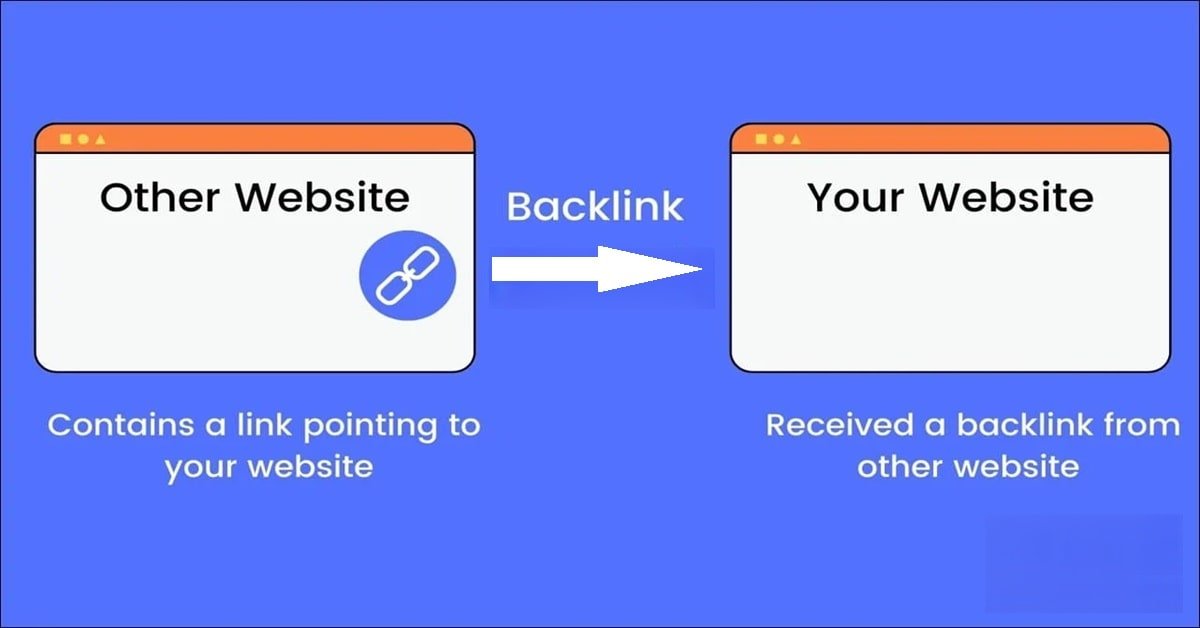What is a Backlink?
A backlink, also known as an inbound link or incoming link, refers to a hyperlink from one website to another. When a website links to your website, that link is considered a backlink for your site. Backlinks are a critical component of Search Engine Optimization (SEO), as they help search engines, like Google, determine the relevance, authority, and trustworthiness of a website. The quality and quantity of backlinks to a site can significantly influence its position in search engine results pages (SERPs).
Backlinks are categorized into two primary types:
- Do-Follow Links:
- These backlinks allow search engines to follow the link and pass on “link juice,” which contributes positively to a website’s authority and ranking in search results.
- No-Follow Links:
- While these links do not pass link juice to the linked site, they still can drive traffic. They instruct search engines not to follow the link or count it towards the site’s ranking.
Does My Website Need Backlinks?
Yes, backlinks are vital for any website aiming to improve its online presence and search engine rankings. Here are several reasons why:
- Improved SEO:
- Backlinks are one of the primary factors search engines consider to rank sites. High-quality backlinks coming from authoritative sites can significantly boost your website’s credibility and visibility.
- Referral Traffic:
- Backlinks also serve as a direct source of referral traffic. When users click on a backlink to your website, it brings potential customers and engaged visitors who may explore your content further.
- Increased Visibility and Brand Awareness:
- By having backlinks from well-known websites, your site’s visibility increases, building brand awareness in the process. Users are more likely to trust and recognize your brand when they see it linked on reputable sites.
- Establishing Authority:
- Having a network of backlinks from trusted and relevant sources establishes your website as an authority in your niche. This can lead to other sites wanting to link back to you, creating a virtuous cycle of connection.
- Competitive Advantage:
- Building a robust backlink profile helps you stay competitive in your industry. If your competitors have a strong backlink strategy, not having one could mean losing traffic and potential customers.
- Increased Authority and Trustworthiness:
- Websites that have backlinks from reputable and authoritative sites are viewed as more credible by search engines. This trustworthiness can lead to better rankings and more visibility.
- Faster Indexing:
- Search engines discover new content by following links. If your website has backlinks from established sites, search engines are more likely to find and index your pages quickly.
- Brand Authority and Exposure:
- High-quality backlinks can enhance your brand’s visibility and authority in your niche or industry. They can serve as endorsements, providing exposure to new audiences.
- Long-Term SEO Benefits:
- Unlike many SEO tactics that provide short-term results, quality backlinks can offer sustained benefits over time. As they continue to drive traffic and improve rankings, the effects can compound.
- Insight into Competitors:
- Analyzing the backlink profiles of competitors can provide insights into their strategies. This information can help you identify opportunities for your own link-building efforts.
Best Practices for Building Backlinks
- Create High-Quality Content: Valuable content is more likely to attract links naturally.
- Guest Blogging: Writing articles for other reputable sites can provide backlinks to your site.
- Build Relationships: Networking with other bloggers and industry professionals can lead to organic backlink opportunities.
- Leverage Social Media: Sharing your content on social platforms can increase visibility and lead to backlinks.
- Engage in Forums and Communities: Participating in discussions can help you share your expertise and gain links naturally.
How to get backlinks?
Getting backlinks is a key component of a successful SEO strategy. Here are several effective methods to build high-quality backlinks:
1. Create High-Quality Content
- Valuable Resources: Produce informative articles, guides, infographics, and case studies that others will find useful and want to link to.
- Unique Research: Publish original research or data that can serve as a reference point for others in your industry.
2. Guest Blogging
- Write articles for reputable blogs within your niche. Ensure the content is high quality, and include a link back to your site in your author bio or within the content (if allowed).
3. Build Relationships
- Network with bloggers and industry influencers. Engage with their content, share it, and build genuine relationships that may lead to backlinks.
4. Utilize Social Media
- Share your content on social media platforms to increase visibility. When people find your content valuable, they may link back to it from their own sites.
5. Participate in Online Communities
- Engage in relevant forums, subreddits, and Q&A sites like Quora. When appropriate, link back to your content to provide additional information.
6. Broken Link Building
- Identify broken links on other websites (tools like Ahrefs or Check My Links can help). Reach out to the website owner, inform them of the broken link, and suggest your content as a replacement.
7. Resource Pages
- Look for resource pages in your niche that list helpful links. Reach out to the webmasters of these pages to suggest your content for inclusion.
8. Press Releases and Media Coverage
- Craft press releases for significant news related to your business. Distributing these can lead to coverage and backlinks from news outlets.
9. Testimonials
- Write testimonials for products or services you use. Companies often display these on their websites with a link back to your site.
10. Interviews and Podcasts
- Offer to be interviewed on podcasts or for articles. This presents an opportunity to share your expertise and earn backlinks to your site.
11. Collaborate on Webinars or Events
- Partner with other industry experts to host webinars or co-create content. Both parties can promote the content and link back to each other’s sites.
12. Create Shareable Visual Content
- Infographics and videos are highly shareable. Create visually appealing content that provides value and encourage others to link to it.
13. Skyscraper Technique
- Find popular content in your niche, improve upon it, and then reach out to sites that linked to the original piece, suggesting your enhanced version as a better resource.
14. Directories and Listings
- Submit your website to reputable directories and listings relevant to your industry. Be cautious to choose high-quality sites to avoid potential penalties.
15. Monitor Competitor Backlinks
- Use tools like Ahrefs or SEMrush to analyze your competitors’ backlink profiles. Identify their link sources and try to acquire backlinks from the same sites.
How to check backlinks
Checking backlinks to your website is a crucial part of SEO, as it helps you evaluate your site’s performance and identify opportunities for improvement. Here are several methods and tools you can use to check backlinks effectively:
1. Google Search Console
- How to Use:
- Verify your website with Google Search Console.
- Go to the Links section in the left sidebar.
- Under the External Links section, you can see the total number of backlinks, the linking domains, and the most linked pages on your site.
- Pros: Free and reliable source of backlinks data directly from Google.
2. Ahrefs
- How to Use:
- Go to the Ahrefs website (subscription required).
- Enter your website URL in the Site Explorer tool.
- Click on the Backlinks report to see detailed information about your backlinks.
- Pros: Offers comprehensive backlink analysis, including the quality of the links, anchor text, and historical data.
3. SEMrush
- How to Use:
- Access SEMrush (subscription required) and go to the Domain Overview.
- Enter your domain name to get an overview.
- Navigate to the Backlinks section for detailed insights.
- Pros: Provides a user-friendly interface and additional SEO metrics.
4. Moz Link Explorer
- How to Use:
- Visit the Moz website and access Link Explorer (free limited access).
- Enter your website URL to view the backlink profile.
- Check metrics like Domain Authority (DA) and Spam Score.
- Pros: Offers insights into authority metrics along with backlink data.
5. Majestic
- How to Use:
- Go to the Majestic website (subscription may be required) and enter your URL.
- Explore the Backlinks section for detailed link analysis.
- Pros: Known for its extensive backlink index and unique metrics like Trust Flow and Citation Flow.
6. Ubersuggest
- How to Use:
- Visit the Ubersuggest website (free version available).
- Enter your domain in the search bar.
- Navigate to the Backlinks tab for an overview of your backlinks.
- Pros: Easy to use and provides a basic overview of backlinks for free.
7. Linkody
- How to Use:
- Sign up for Linkody (subscription required).
- Enter your domain to start tracking your backlinks.
- View your backlink profile and get alerts for new or lost links.
- Pros: Offers a monitoring feature and easy-to-understand reporting.
8. Check My Links
- How to Use:
- Install the Check My Links extension on your Chrome browser.
- Use the tool to analyze individual web pages for broken links and find backlinks.
- Pros: Useful for finding broken links on your site and assessing link quality.
9. BuzzSumo
- How to Use:
- Go to the BuzzSumo site (subscription may be required).
- Enter your content or domain to see who has linked to it.
- Pros: Helps identify backlinks and track popularity of your content.
12 FAQs about Backlinks
- What is the difference between a do-follow and a no-follow backlink?
- Do-follow links pass SEO benefits, or “link juice,” to the linked site, positively influencing its authority. No-follow links do not pass this benefit but can still generate referral traffic.
- How can I check my website’s backlinks?
- You can use various tools like Google Search Console, Ahrefs, SEMrush, or Moz to check your site’s backlink profile, see which websites link to you, and analyze the quality of those links.
- Are all backlinks created equal?
- No, backlinks vary in quality. A backlink from a high-authority site in your niche carries more weight than a link from a low-authority or unrelated site. Quality backlinks help improve your SEO more effectively.
- How do I get backlinks for my website?
- You can acquire backlinks through content marketing (creating high-quality content that others want to share), guest blogging (writing articles for other sites), influencer outreach, and by building relationships in your industry.
- What is a backlink profile?
- A backlink profile is a comprehensive view of all the backlinks pointing to a specific website, which includes the quality, quantity, and relevance of those links.
- Can backlinks hurt my website’s SEO?
- Yes, low-quality or spammy backlinks can harm your SEO. Search engines may penalize your website for having malicious links. Use tools to regularly audit your backlinks and disavow harmful links if necessary.
- How long does it take for backlinks to impact SEO?
- The time it takes for backlinks to impact SEO can vary, but generally, noticeable changes can take weeks to months. Factors include the authority of the linking site and the overall SEO strategy of your website.
- Do I need backlinks for a new website?
- Yes, backlinks are especially important for new websites to build authority and improve visibility. Prioritize acquiring high-quality backlinks early in your SEO efforts.
- Is it important to have backlinks from related websites?
- Yes, backlinks from sites that are relevant to your industry or niche are more effective. They signal to search engines that your content is valuable to that audience.
- How many backlinks do I need for good SEO?
- There’s no specific number of backlinks that guarantees good SEO. Focus on building high-quality, relevant backlinks rather than aiming for a specific quantity. Quality generally outweighs quantity.
- What is link building?
- Link building is the process of acquiring backlinks to your website. This can be accomplished through various methods including content creation, partnerships, and outreach efforts to relevant websites.
- Can I buy backlinks?
- While some may offer to sell backlinks, this practice is risky and generally considered against Google’s guidelines. Purchasing backlinks may result in penalties or damage to your website’s reputation. A more sustainable approach is to focus on earning links organically through quality content and relationships.
Conclusion
Backlinks play a crucial role in determining a website’s authority and visibility on search engines. Understanding what backlinks are, how they work, and their importance in SEO is vital for any website owner or digital marketer. By prioritizing the quality and relevance of your backlinks, you can enhance your website’s trustworthiness, attract more traffic, and improve your overall search engine rankings.


